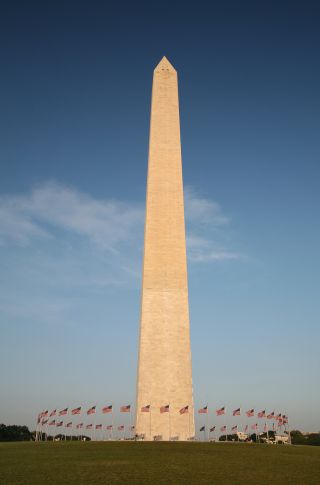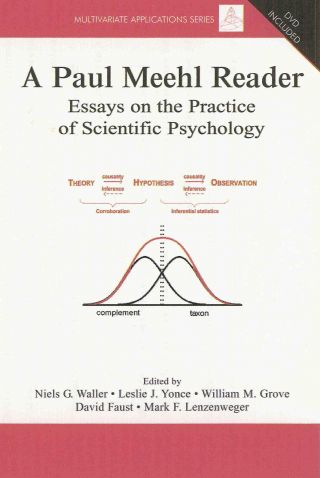Freudian Psychology
Paul E. Meehl: Smartest Psychologist of the 20th Century?
I explore a claim made by an undergraduate teacher almost 40 years ago.
Posted February 8, 2014
In 1975, my undergraduate abnormal psychology teacher, Neil P. Young, made a claim that I will never forget: that Paul E. Meehl of the University of Minnesota was "the smartest living psychologist." I cannot remember how many reasons Dr. Young gave to support his claim. The only explanation I remember him giving concerned an informal study that Meehl conducted in which Meehl successfully predicted that the wall plaques in the stairwell of the Washington Monument would show more financial donations from fire departments than police departments.

Why was this study indicative of Meehl's brilliance? Because it showed that Meehl was able to come up with a prediction, subsequently verified by empirical observation, that no other living psychologist could have made. Think about it: If you spent your entire life making predictions about human behavior, would you ever have hypothesized that fire departments contributed more money to the Washington monument than police departments? Do you know any professional psychologists who might have come up with this prediction? Can you even imagine how Meehl was able to make this prediction?
It is easy to make a psychological prediction that seems plausible from common sense. For example, it is easy to predict that a valid measure of conscientiousness (one of the five major personality factors) will predict students' grade point averages. We all know that earning high grades depends on self-discipline, perseverance, being well-organized, and hard work—all aspects of conscientiousness. Unsurprisingly, a meta-analytic review of 51 studies confirms common sense: conscientiousness indeed predicts GPA. What is perhaps surprising is that 51 studies were conducted to confirm what we already knew from common sense.
So, how was Meehl able to make a prediction that was not like to occur to any other living psychologist? Because he was very intelligent? Creative? Perhaps, but "intelligence" and "creativity" are just short-hand descriptions summarizing his ability to come up with clever ideas. In what particular way was Meehl smart or creative?
According to Neil Young, what really helped Meehl was his extensive familiarity with Freudian theory, both as an academician and a practicing psychotherapist. Now, I do not want to make this post and its comments an argument about the merits and shortcomings of Freudian theory. That is an old and boring debate. I only want to explain what it is about Freudian theory that enabled Meehl to make his prediction: that the theory contains genuinely theoretical constructs that are unobservable in everyday experience.

Specifically, Freud's theory of psychosexual development employs the theoretical constructs of fixation and phallic stage to generate another theoretical construct, phallic character. Phallic character development, seen almost exclusively in males, involves a preoccupation with fire and other phallic symbols. Pyromaniacs often wet the bed while dreaming of urinating on fires, a topic addressed by Freud in Civilization and Its Discontents. In this essay, Freud mentions a topic familiar to all boys who have gone camping, the male urge to micturate on campfires. Now, from a Freudian perspective, the Washington monument is easily viewed as a phallic structure erected in honor of the father of our country. (And the myth of Washington chopping down the cherry tree can be seen as an adult version of Jack and the Beanstalk, that is, an Oedipal fantasy of turning the tables to castrate his father and have his mother.) Fire fighters are predominantly men for whom blasting fires with high-pressure water hoses is a distinctive component of their work. True, the guns of police officers can be regarded as phallic symbols, too. But the phallic imagery of shooting bullets at bad guys is much weaker than the epic phallic battles of fire fighters. Consequently, one should find more financial donations to the Washington monument from fire departments than police departments. The prediction is confirmed by observation, Q.E.D.
Note that Meehl's successful prediction is not proof of the validity of psychoanalytic theory. (Proving theories is not what science is about.) Rather, it shows the power of Freud's theory to generate a testable prediction that is totally unobvious from common sense, due to the theory's employment of constructs not present in everyday, ordinary awareness. That is what powerful theories do; they allow us to create hypotheses that are impossible to imagine from common sense. Part of Meehl's intelligence was recognizing and employing the power of Freud's theory.
(As an aside, hopefully not detracting too much from this post about Meehl, I think that the theory of evolution through natural selection is a much better, more powerful theory than Freud's. Evolutionary theory has certainly generated many more non-obvious predictions that have been confirmed by empirical observation. In the words of Edouard Machery, evolutionary theory is "psychology's best discovery heuristic.")

At the time that Neil Young pronounced Meehl the smartest living psychologist, I was just finishing up my undergraduate work at Penn State. I did not have anywhere near the amount of information necessary to evaluate that claim. Today, with nearly 40 years of additional experience in the field of psychology, I can better appreciate Meehl's work, which spans a breath-taking range of subjects. For starters, there are the contributions he made to the philosophy and methodology of science in the time of Karl Popper, Norwood Russell Hanson, Thomas Kuhn, and Paul Feyerabend. With Lee Cronbach, he wrote an enormously important paper on construct validity in psychological testing. Along the way, he contributed to the construction of the MMPI and to "cookbooks" for interpreting patterns of MMPI scores. He carefully documented how actuarial/statistical prediction is superior to clinical prediction (see also here.) He contributed to behavior genetics and recognized long before many psychologists the genetic origins of schizophrenia. He grappled heroically with the issue of traits and types in taxonomics. In many publications on psychological methods he pointed out that the emperor was wearing no clothes, particularly on the issue of significance testing. Every psychologist should read Theory Testing in Psychology and Physics: A Methodological Paradox.
But perhaps my favorite Meehl essay was his very first publication (1945, Journal of Clinical Psychology), which was instantly a classic: The Dynamics of "Structured" Personality Tests. In this brilliant piece, he explains why it is naïve to assume what people are thinking and feeling when they respond to items in self-report personality tests. This article has been an inspirational influence on my own research program on the dynamics of personality testing.

What I have cited above is just a sampling of Meehl's contributions to psychology. I have not even mentioned his writings on the interfaces between psychology and the law, politics, and religion. For a comprehensive picture of his work, visit the Paul E. Meehl webpage at the University of Minnesota.




